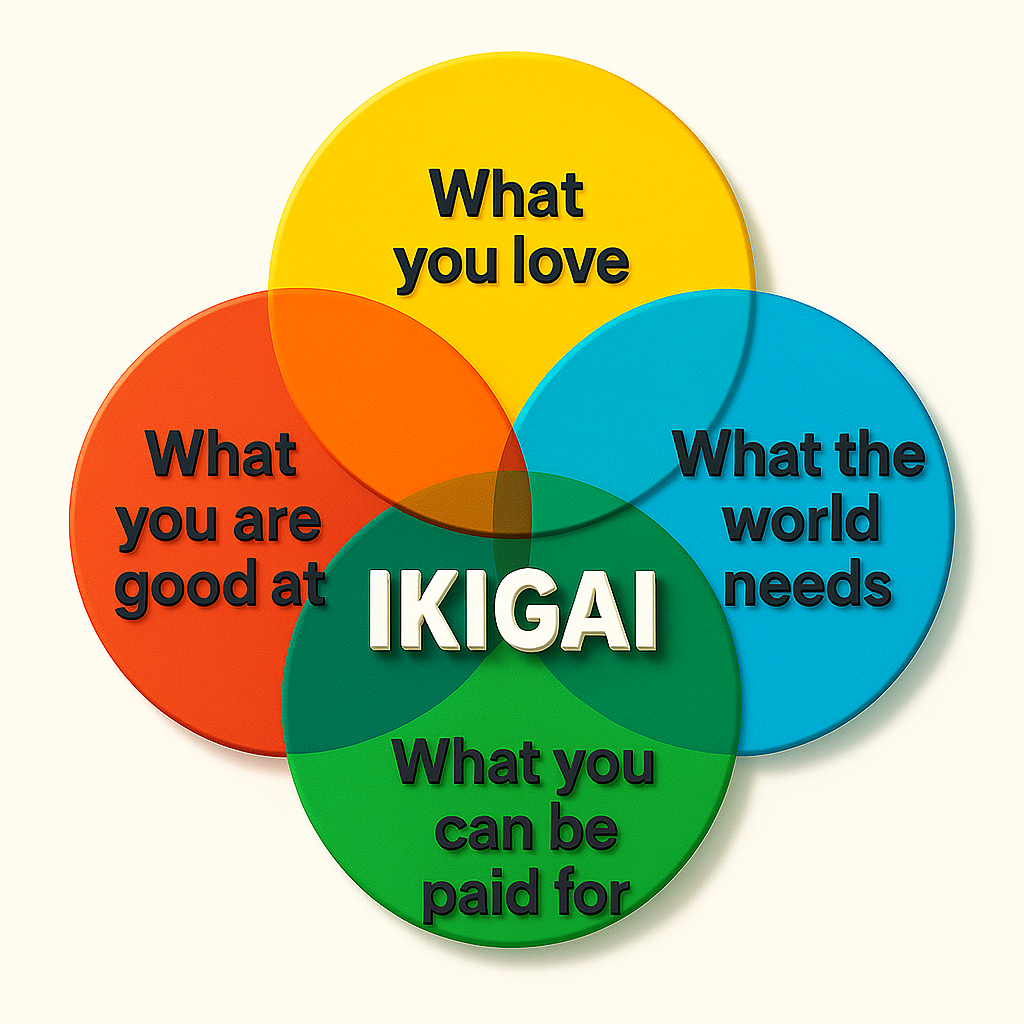Ikigai Explained: How Purpose Leads to a Longer, Happier Life
Discover Ikigai—the Japanese secret to purpose, flow, and longevity. Learn how small daily habits can create a happier, more meaningful life.

Why Ikigai is Everywhere
In a world obsessed with productivity hacks, Ikigai feels refreshingly timeless. My wife was gifted a book on Ikigai, but I took it instead since it piqued my interest.
I was pleasantly surprised to learn that Ikigai is the Japanese concept of “reason for being". It turns out that in Okinawa, Japan, there are entire towns dedicated to living the Ikigai way. Okinawan elders, who regularly live past 100, attribute their longevity to a lifestyle centered on four key pillars: diet, exercise, purpose, and strong social ties.
What suprised me most is Ikigai is not a rigid framework but rather a compass on how to live a full healthy life.
What Ikigai Really Means

Ikigai sits at the intersection of four overlapping circles. Each circle represents a dimension of life we’re all trying to balance:
- What you love
- The passions that light you up. This could be anything, but what is essential is that it is what ignites a fire inside you.
- These are the activities that make time disappear—whether it’s coding, cycling, painting, or building businesses. I would expand this to an activity that enables you to enter a state of flow.
- Without this circle, life becomes mechanical and joyless.
- What you’re good at
- Your skills, strengths, and talents. (This typically aligns with what you love)
- This doesn’t just mean “natural gifts”—it also includes things you’ve trained hard to master. For me, this is coding and writing.
- When you ignore this circle, you risk chasing passions without the competence to make them sustainable.
- What the world needs
- The problems worth solving, the gaps worth filling.
- It pushes you beyond self-interest, grounding your work in service and meaning.
- Without this circle, purpose becomes self-indulgence.
- What you can be paid for
- The practical side: economic value.
- This isn’t just about a paycheck—it’s about finding ways to sustain your lifestyle and keep doing what matters to you.
- Ignoring this circle can leave you passionate but broke.
At the center, where all four circles overlap, is Ikigai—a sweet spot where passion, mission, vocation, and profession align. Ikigai is a compass for making choices that bring both joy and resilience. The true meaning of Ikigai is different for everyone, but the principles are the same.
When you find your Ikigai, longevity typically follows. The book's authors actually visited a couple of towns where it has the most 100-year-olds in the world, and not surprisingly, they are all very active, dancing, and really engaged in their communities.
Now, compare this to non-Ikigai lifestyles (Western Culture), where community takes a backseat, sitting replaces movement, and many never uncover their passion. It is easy to see where we can make improvements in our lifestyles.
We all have an Ikigai, but most probably don't know it or have identified it yet.
Principles of Living with Ikigai
Keep Moving
Staying active is tied to vitality (Japanese proverb). Actually, Ikigai insists that you never stop working or moving. Several times, the book interviewed 100-year-olds, and they swore that "working" was their key to staying busy and healthy. Now, working is not just the 9-to-5; it can be anything from helping in the community to working in your garden. What is essential is to stay active and engaged. Ikigai says once you stop, this is when your health and mental state deteriorate.
Choose Compass over Map
Life happens, so we need to remain flexible, which reduces stress if something doesn't work out. Adaptability beats rigid planning.
Flow Over Goals
Rituals and flow states create happiness. It is not the outcome that is important, but being able to get into a state of mental flow that calms the body and mind.
Protect Your Focus
Stay Updated
Get actionable AI & tech insights delivered every Friday. No fluff, just value.
Subscribe to The Weekly Byte →Multitasking Undermines Performance. We can never enter a state of flow if we are constantly interrupted. So, find the best environment, time, and space that rewards you with protected focus.
Live in the Now
Resilience through presence.
"The past is gone, the future is uncertain—the present is all we control" - Buddhist and Stoic wisdom.
Ikigai in Practice
It’s one thing to understand Ikigai as a concept, but the real value comes when you apply it to daily life. You don’t need to overhaul your career or move to Okinawa. Small, consistent actions aligned with the four circles are enough to shift the needle.
1. Build Rituals, Not Just Goals
Instead of chasing lofty goals(think New Year's resolutions), design daily habits that bring you into flow. For example, write for 30 minutes every morning, cycle a set route after work, or dedicate time to learning a new skill. These rituals stack up to something far bigger than short-term goals. The ritual should be easy enough to incorporate into your daily routine without being too challenging to form a habit.
2. Protect Your Focus
Modern life rewards busyness, but multitasking dilutes energy and actually impairs your memory and productivity. Create space for deep work: one task, one flow state. This not only boosts productivity but also connects you to the satisfaction of being fully absorbed in the present. Find your Flow, make space for yourself. Distraction Free Flow...
3. Invest in Relationships
Ikigai isn’t a solo sport. Surround yourself with people who challenge, support, and inspire you. Schedule dinners, join communities, or strengthen ties with family and friends. Social bonds are one of the strongest predictors of longevity.
4. Redefine Success
Ikigai reframes success as progress in the present, not a trophy at the finish line. It’s about asking: Did I spend today doing something meaningful, with people I care about? That answer matters more than quarterly results, likes, or follower counts.
5. Start Small, Start Now
You don’t have to find your perfect overlap immediately. Experiment. Test hobbies, side projects, or skills that interest you. Over time, the four circles begin to align naturally.
What’s one ritual you could add tomorrow that brings you into flow?
My Ikigai Reflections
Personally, I have a lot of different hobbies. However, I need to carve out more time for myself to focus on one thing and get into my flow. I can find my flow state with writing, coding, or cycling. What I need to ensure is to remove distractions, which means timeboxing my flow and eliminating all distractions.
For me, this is a big challenge as I have a lot going on, as do most of us. But, I'm going to be more diligent on carving out 30 minutes to 1 hour per day for my Ikigai flow state.
Next is community. Yeah, I need to get a bit more involved in my local community here in Switzerland. A recent trip back to Arizona highlighted how easy it is to be part of a community. In the Arizona community, it felt effortless. Here in Switzerland, it requires effort, which might indicate this might be part of my Ikigai journey.
Finally, I want to find one or two more hobbies that enable me to enter a flow state.
6. Conclusion: Finding Your Ikigai
We all have an Ikigai, but most probably don't know it or have identified it yet. But now take the time and find your Ikigai.
If you don’t know your Ikigai yet, start with the small things you love doing. It grows from there. Start now and find your reason for being...your Ikigai!
Longevity and happiness come not from shortcuts, but from purpose lived daily.
I read the book Ikigai: The Japanese Secret to a Long and Happy Life to help me jumpstart my path towards finding my Ikigai. Maybe it can help you as well.
Ikigai Frequently Asked Questions
Q: What is Ikigai?
A: Ikigai is a Japanese concept meaning “reason for being.” It’s the sweet spot where four elements intersect: what you love, what you’re good at, what the world needs, and what you can be paid for. When all four align, that’s your personal Ikigai — a compass for living a full, resilient, and meaningful life.
Q: How does Ikigai relate to longevity?
A: In Okinawa, where many people live past 100, Ikigai isn't just a philosophy—it’s embedded in daily life. Okinawan elders stay active, keep strong social ties, eat well, find purpose, and engage in rituals that maintain their flow. These practices, tied to Ikigai, are seen as part of the “Japanese longevity secret.”
Q: Can I apply Ikigai in my daily life even if I’m not doing what I love as my job?
A: Absolutely. Ikigai isn’t just about work. It’s about rituals, community involvement, hobbies, and small consistent actions. You can build parts of your Ikigai through side projects, volunteering, cultivating relationships, and carving out flow states outside of your job. The key is to align with the four circles as much as possible.
Q: What if I don’t know what I love or what I’m good at yet?
A: That’s pretty common. The process involves experimentation. Try different activities, see what energizes you and which things feel meaningful. Reflect on times when you lost track of time (flow). Over time, patterns emerge that point you toward your passion and strengths.
Q: How is Ikigai different from chasing goals or achievements?
A: Chasing goals often focuses on specific outcomes—milestones, trophies, recognition. Ikigai shifts focus toward rituals, flow, and meaning in the present moment. It emphasizes sustainable, ongoing wellbeing, rather than one-off achievements. In Ikigai, happiness comes more from living in alignment daily than from occasional wins.
Q: Is Ikigai a static thing or something that changes over time?
A: It changes. As you grow, your context changes, your skills evolve, your world view shifts. Your Ikigai may look different in different seasons of your life. The important part is staying aware, iterating, and staying aligned with those four circles—what you love, what you're good at, what the world needs, what you can be paid for.



